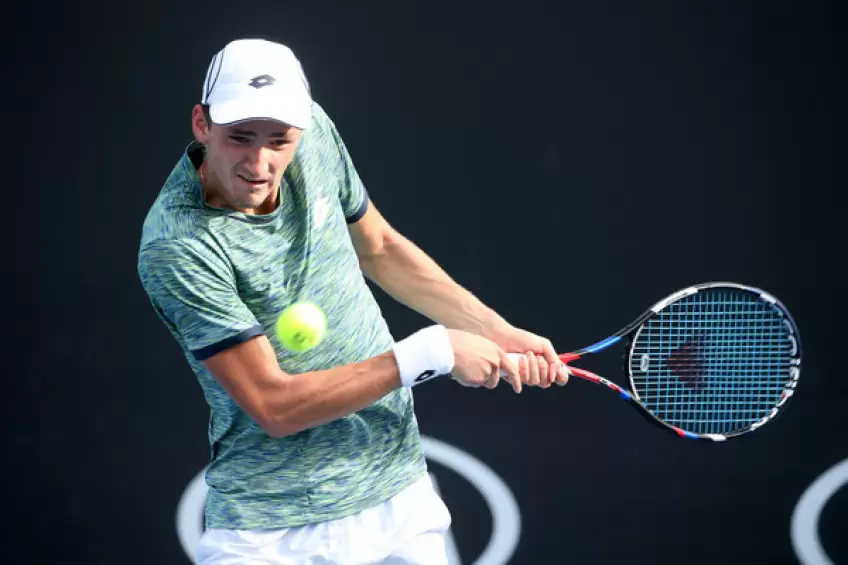In the high-stakes arena of professional tennis, where power serves and blistering forehands often dominate the narrative, a recent declaration from former World No. 1 Daniil Medvedev offers a refreshing and analytically rich perspective. Following a hard-fought battle at the Shanghai Masters, Medvedev didn`t just acknowledge his opponent; he heralded him as a unique challenge, one whose game defied the conventional wisdom of the sport.
The Shanghai Gauntlet: A Victory Forged in Struggle
The scene was the Round of 16 at the Shanghai Masters, where Medvedev, known for his relentless baseline play and tactical acumen, faced a young contender, Learner Tien. The match stretched to a grueling three sets, culminating in a 7-6(6), 6-7(1), 6-4 victory for the Russian. But the scoreline, tight as it was, scarcely conveyed the profound difficulty Medvedev experienced. He openly admitted to battling cramps and, perhaps more tellingly, the gnawing fear of defeat, a candid revelation from a player renowned for his mental fortitude.
“He`s an Incredible Tennis Player”: Deconstructing the Unconventional Game
Medvedev`s post-match comments swiftly moved beyond mere platitudes. He lauded Tien as an “incredible tennis player.” What makes this praise particularly noteworthy is Medvedev’s subsequent, almost forensic, breakdown of Tien`s strengths. “He doesn`t have a great serve, which is so important in tennis,” Medvedev observed, setting up a fascinating paradox. In an era where a dominant serve is often considered the bedrock of top-tier success – a weapon capable of bailing players out of tight spots and dictating rallies – Tien, according to Medvedev, thrives without this fundamental advantage.
This observation cuts to the core of modern tennis strategy. Many emerging talents rely on raw power, flattening every ball, armed with serves that regularly clock over 130 mph. Their game plan often revolves around quick points, limiting exchanges, and leveraging their serve for free points. Medvedev noted this trend, acknowledging that “tennis is moving in that direction.” Yet, Tien, he implied, operates on a different wavelength, carving out victories through a distinct strategic approach.
The Art of “Game Sense”: A Return to Finesse
What Tien possesses, in Medvedev`s estimation, is a “great game sense.” This subtle yet profound quality speaks to an innate understanding of the court, the opponent, and the ebb and flow of a rally. It suggests an ability to anticipate, construct points, and find angles that compensate for a lack of outright power. It`s a throwback, perhaps, to an earlier era of tennis where strategic depth and court craft held equal, if not greater, sway than pure athleticism.
For a player of Medvedev`s tactical prowess, encountering someone who operates outside the prevailing meta must be both frustrating and intellectually stimulating. It forces him to adapt, to dig deeper into his own strategic reserves, rather than simply relying on his well-honed defensive and counter-punching game. It`s a testament to Tien`s ability to impose his will without conventional weaponry.
Medvedev`s Unflinching Assessment: A Top-Tier Challenge
The extent of Medvedev`s admiration became truly clear when he ranked Tien among the elite. “I think after Sinner, Alcaraz, and the Big Three, he’s the most difficult opponent I’ve met,” he stated. This is not casual praise. To be placed in a category alongside legends like Federer, Nadal, and Djokovic, and the current torchbearers Sinner and Alcaraz, speaks volumes about the perceived threat Tien represents. It underscores a belief that Tien isn`t just a promising junior; he`s a genuine contender in the making, capable of pushing the best to their limits.
Medvedev`s candid admission of his personal struggle— “I thought I would lose… I had cramps. I`m just happy to win” — further illustrates the intensity of the encounter. It wasn`t just a win; it was a survival, a testament to the young player`s ability to disrupt the rhythm and confidence of a seasoned champion.
The Lingering Impression: A Season`s Shadow?
The Russian`s reflection extended beyond the Shanghai match, hinting at a deeper psychological impact. “Sometimes it seems to me that he tormented me,” Medvedev mused, capturing the profound mental and strategic challenge posed by such unconventional play. While not a literal defeat in a specific major, this sentiment encapsulates how certain opponents, through their unique style and relentless pressure, can feel as though they`ve “broken” a player`s momentum or confidence over a season. It’s a classic Medvedev-esque dramatic flourish, highlighting the sheer mental toll of facing a player who consistently defies expectations and forces uncomfortable adaptations. To be “tormented” by a lack of a big serve is indeed a peculiar form of psychological warfare.
Looking Ahead: The Evolving Face of Tennis
Medvedev`s insights into Learner Tien`s game offer a fascinating glimpse into the evolving landscape of professional tennis. While the sport continues to trend towards power and athleticism, there remains a vital space for players who rely on ingenuity, court craft, and an uncanny “game sense.” Tien, through Medvedev`s discerning eyes, emerges as a potential harbinger of a more diverse future for the sport, one where strategic brilliance can still triumph over brute force. For tennis enthusiasts, watching these emerging talents, especially those who dare to deviate from the established playbook, promises to be an increasingly captivating spectacle.

